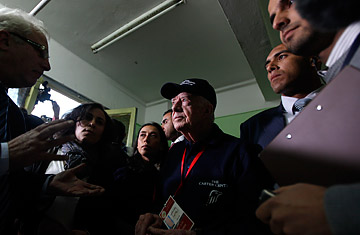
Former U.S. President Jimmy Carter, center, visits a polling site during run-off voting in the parliamentary election in Cairo, Egypt, Tuesday, Jan. 10, 2012.
(2 of 2)
Well what do you think about the aid? Is that something that needs to continue?
I believe that Egypt has now suffered so severely from the revolutionary causes that they need financial assistance from the United States and from the Arab world as well, yes.
To the military.
To the government. Yeah, I wouldn't say just to the military, but to the general economy of Egypt.
Looking specifically at the military aid though.
Well part of the budget that goes into Egypt will be devoted to the military. But we met yesterday with the prime minister who is suffering severely for the need, he says, of $10 billion in the next three months in order just to meet their debts. And of course the alternative is to dramatically reduce the expenditure of the government. For instance on subsidies of bread and subsidies for fuel. Which could precipitate an uprising by the people. As we see recently in Nigeria. Today as a matter of fact. So yes, I think the U.S. aid should come to Egypt even though part of it--I think a small part of it--would go to the military.
I want to talk a bit about the Arab Spring, and how you view U.S. policy throughout the past year and whether you would have done anything differently. Do you think President Obama's intervention in Libya was a success, and why do you think the administration has differed in its approach to Syria?
Well there's an infinite difference between Syria — and its ancient heritage, its strength, its influence in the Arab world — and Libya which was basically out on a limb by itself. Nobody in the rest of the Arab world really cared about maintaining the integrity of the Gaddafi regime. And even some of the Arab countries, as you know, participated in the NATO [intervention]. I think that President Obama went into Libya in a very reluctant fashion, following the lead of France and Great Britain through NATO. We played a limited role in Libya compared to what France did for instance. And it has turned out so far successfully in the overthrow of the Gaddafi regime. We don't know what's going to happen in the future but democracy and freedom. And obviously in Tunisia, that wasn't necessary for us to intercede. The Carter Center monitored the election in Tunisia: very successful so far. But I don't think there's any inclination on the part of NATO or any member of NATO or the Arab countries to intercede militarily in Syria. And the hope is to work through the Arab League — which is a weak reed, I know, and they don't have a powerful force — to ... to bring about some reconciliation there. But whether they'll be successful, nobody knows.
And if it's not successful?
Well if it's not successful, in the worst case it could degenerate into a civil war in Syria, which would be devastating, even compared to recent experiences.
And at some point would the western world, would NATO or the United States, be justified in lending a hand in Syria the way it did in Libya?
No, I don't think so. I don't think that's likely at all.
You mentioned the peace process and how certain partners in it haven't fulfilled their promises to the Palestinians. What do you think it would take to get that back on track?
Strong leadership from the United States, and cooperation with Egypt in the effort to orchestrate reconciliation between the Palestinians — between the two major factions in Palestine, which the United States has opposed in the past, and elections in Palestine. And a singular and strong Palestinian voice to negotiate directly with Israel on the key issues to effectuate a two state solution.
One more question, not about the Middle East, but about Tim Tebow, the football sensation. As an evangelical president, what do you make of the Tim Tebow phenomenon?
[Laughs] I don't criticize or condemn his ostentatious show of his religious faith. You know, it may be excessive in the eyes of some people. I've watched him on the football field when he's had a notable success with a long pass or a with a touchdown. But he has a right to do that if it's within the rules of the National Football League, and I've seen the same thing happen on the baseball field. There, some of the most notable baseball players on earth... every time they get in the batter's box they make [the sign of the] cross or make some other symbol as though they're making a prayer. So it may be excessive, but he has a right to do it. And if the NFL wants to, they can make rules, because they do punish players that do excessive celebration after they score a touchdown, as you know. There's a penalty involved. They can do the same thing if they wish. It's up to them.
